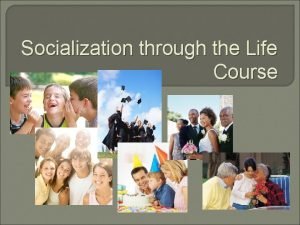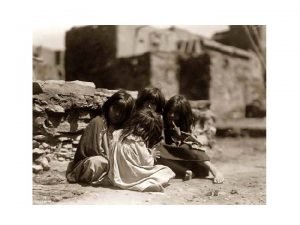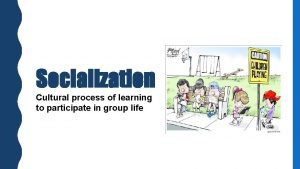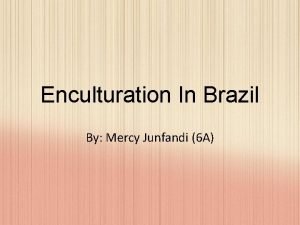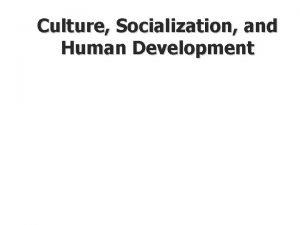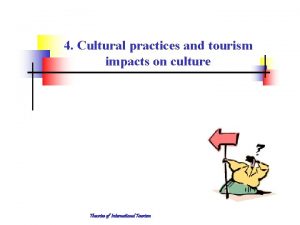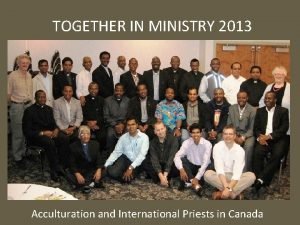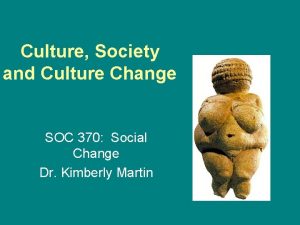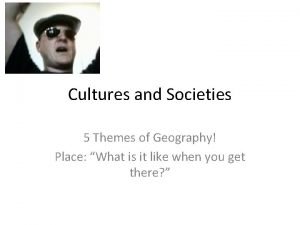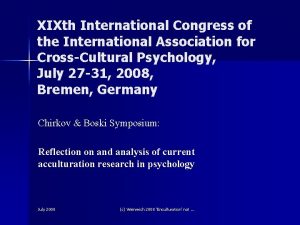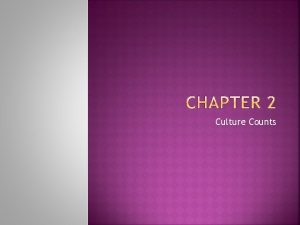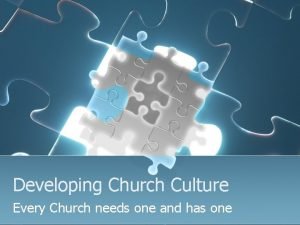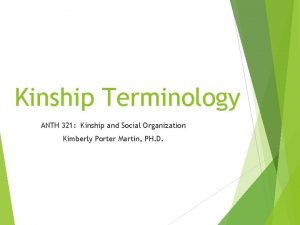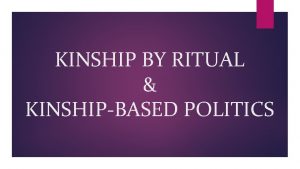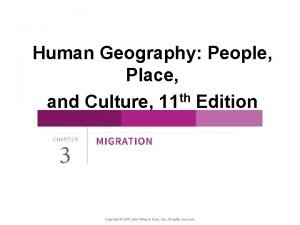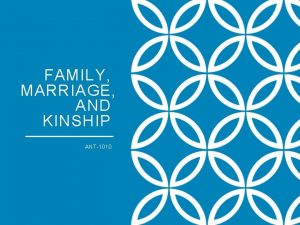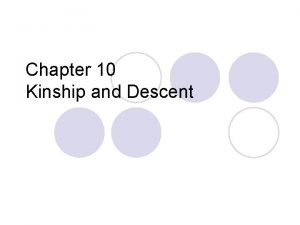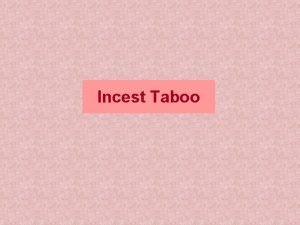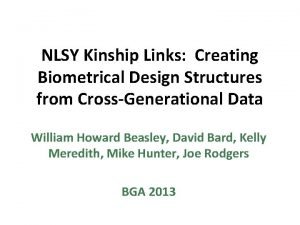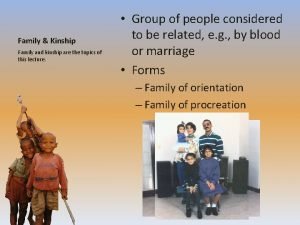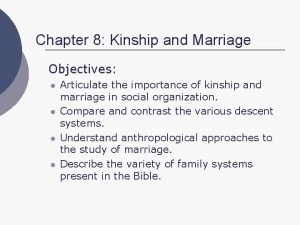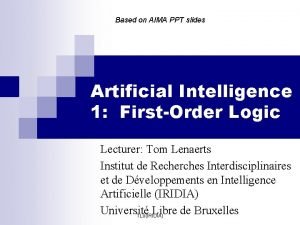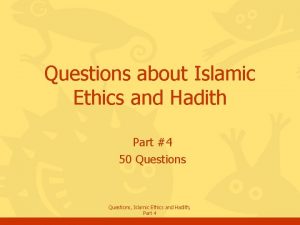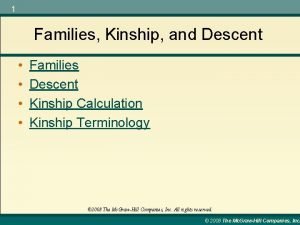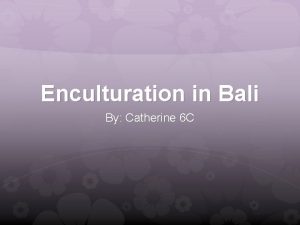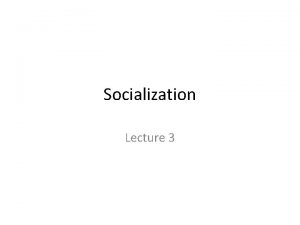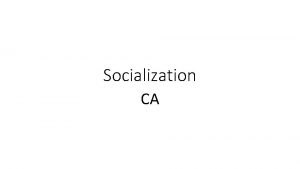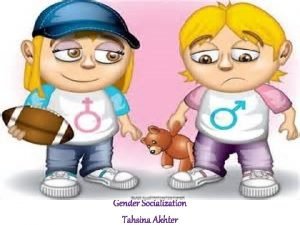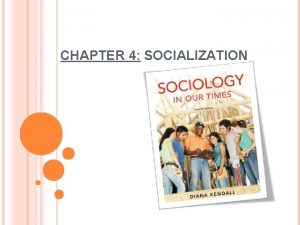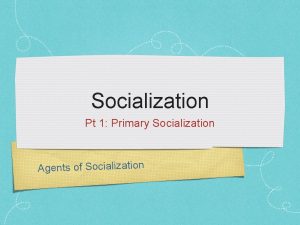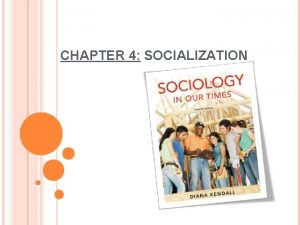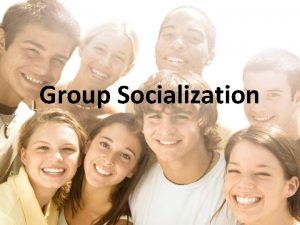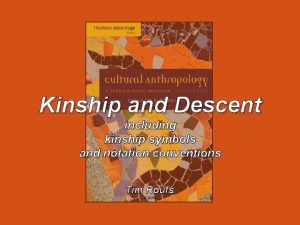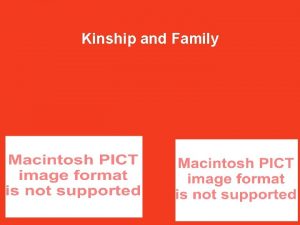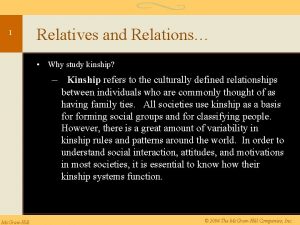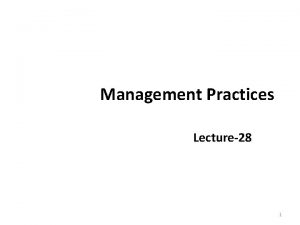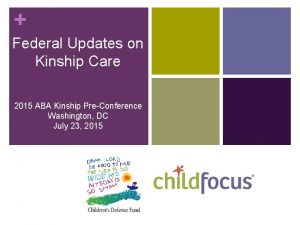Kinship Practices Enculturation Socialization and the Life Cycle































- Slides: 31

Kinship Practices

Enculturation/ Socialization and the Life Cycle ¨ The main agents of SOCIALIZATION (enculturation) – family, school, peer groups, the mass media, and the work (particular attention to gender socialization). ¨ The main stages of life cycle identified as: 1) infancy; 2)childhood and adolescence, 3) young and mature adulthood, and 4) old age ¨ Anthropological notions of “social birth” and “social person” ¨ Social death vs. biological death

Anthropology and the Study of Kinship Practices ¨Kinship (family, marriage, gender) forming the basis of the discipline; ¨ ‘comparable to logic in philosophy and the nude in art’

Kinship: a symbolic idiom that refers to biological ties which people use to organize their social lives. - Kinship and Fieldwork ex. degrees of “relatedness” - Kinship and Biology Ex. mating vs. marriage; births vs. descents; blood metaphor - Kinship terms




Kinship & Politics: Blood is thicker than water?

What is the Family? ¨ A definition of the family that avoids Western ethnocentrism see it as a group composed of a woman and her dependent children, with at least one adult man joined through marriage or blood relationship. ¨ The family may take many forms ranging from a married couple with their children (conjugal family) as in North American society to a large group of several brothers and sisters with the sisters’ children (consanguineal family) as in sw India among the Nayar (the Mosu people of SW China). ¨ The particular form taken by the family is related to particular social, historical, and ecological circumstances.


Functions of family ¨ Nurturance of children Nurturing children traditionally has been the adult female’s job, although men also may play a role, and in some societies mane are even more involved with their children than are women. ¨ Economic Cooperation Dependence on group living for survival is basic human characteristic. Economic activities of men and women complement each other. An effective way to facilitate economic cooperation between men and women and to provide for a close bond between mother and child is through the establishment of residential groups that include adults of both sexes.

The role of family from the functionalist perspective (Talcott Parsons) ¨ Primary socialization (how children learn the cultural norms of the society into which they are born) Q: is family the primary socializing agency? ¨ Personality stabilization (the role family plays in assisting adult family members emotionally). ¨ Enculturation

Family and household ¨ Households are task-oriented residential units within which economic production, consumption, inheritance, child rearing, and shelter are organized and implemented. ¨ Unlike family, the household is universally present. Most households in fact constitute families (family as the core of the household), although other sorts of households may be present as well (e. g. , single-parent household in North America). Ex 1: Among the Nayar, married men and women are members of separate households, meeting periodically for sexual activities.

Family Forms ¨Nuclear Family Married couple + Child(ren) ¨Extended Family Three or more generations

The nuclear family is widespread, but not universal.

Kinship Symbols


The extended family ¨ A collection of nuclear families, related by ties of blood, that live together in one household (which might include grand parents, mother and father, , brothers and sisters, perhaps an uncle and aunt, and a stray cousin or two.

Residence Patterns ¨ Patrilocal residence: a woman goes to live with her husband in the household in which he grew up. ¨ Matrilocal residence: a man leaves the family he grew up to go live with his wife in her parents’ household. ¨ Neolocal residence: a married couple forms a household in a separate location. This occurs where the independence of the nuclear family is emphasized.

Industrialization and Family Organization ¨ North America - Neolocal residence pattern - patterns of residence and family types vary with socioeconomic class (ex. extended families as a response to poverty) - The divorce rate rose steeply between 1970 and 1994

Family units in complex societies ¨ Families are changing to include stepparenting, “reconstituted families, ” gay and lesbian families, single-parenting, divorce, and separation. ¨ Each of these dynamics represents a shift away from the traditional notion the nuclear family and calls attention to transformations that can best be understood in relations to the times in which they are emerged.


Gay/lesbian family in the US ¨ Alternative to traditional nuclear family through adoption or the new reproductive technologies.

Industrialization, State, and Family Planning: China ¨ Single Child Family Policy / Birth Control Biological anthropologists vs. Sociocultural anthropologists ¨ Demographic Transition : - low infant mortality rate - low birth rate







Readings M. Wolf, Uterine Families and the Women’s Community. P. L. Kilbride, African Polygyny: Family Values and Contemporary Changes Rubie Watson, The Named and the Nameless. V. Fong, China’s One-Child Policy and the Empowerment of Urban Daughters
 Socialization through the life course
Socialization through the life course Socialization synonym
Socialization synonym Socialization and enculturation
Socialization and enculturation Enculturation vs socialization
Enculturation vs socialization Poem about socialization and enculturation
Poem about socialization and enculturation Enculturation vs socialization
Enculturation vs socialization Conclusion of child development
Conclusion of child development Cultural drift tourism
Cultural drift tourism Acculturation enculturation
Acculturation enculturation Acculturation and enculturation
Acculturation and enculturation Diffusion and enculturation venn diagram
Diffusion and enculturation venn diagram Assimilation acculturation
Assimilation acculturation Enculturation example
Enculturation example Example of enculturation
Example of enculturation Enculturation defintion
Enculturation defintion Pibloktoq
Pibloktoq Kinship terminology
Kinship terminology Ritual kinship meaning
Ritual kinship meaning What is kinship
What is kinship Kinship links definition ap human geography
Kinship links definition ap human geography Kinship systems
Kinship systems Hawaiian kinship system
Hawaiian kinship system Hawaiian kinship system
Hawaiian kinship system Biological kinship
Biological kinship Kinship links definition
Kinship links definition Kinship diagram symbols
Kinship diagram symbols Kinship definition
Kinship definition Percept sentence
Percept sentence Hadith images
Hadith images A strong affection for another person due to kinship
A strong affection for another person due to kinship Ambilineal descent
Ambilineal descent Blank is the lifelong process of social interaction
Blank is the lifelong process of social interaction
